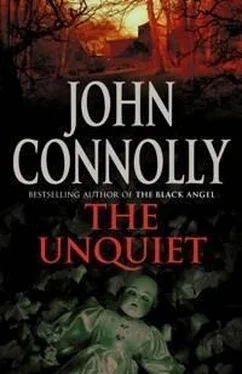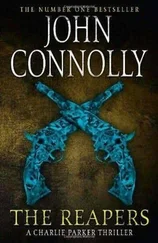We were seated in Block E, right in the center overlooking the circle. There was no sign of Bill, the man Tween was putting our way, although it was clear from what Tween had said that he was likely to be the cautious type where Merrick was concerned. If he was smart, he would be watching us even now. He would be reassured to learn that Merrick was behind bars for a few days. It had bought us all a little more time, for which I was grateful, at least until I was forced to explain the subtle nuances of hockey to a man who thought sport started and finished on a basketball court or an athletics track.
“Come on,” I said. “That’s not fair. Wait until they get on the ice. Some of these guys are pretty fast.”
“Get the fuck out of here,” said Louis. “Carl Lewis was fast. Jesse Owens was fast. Even Ben Johnson was fast on his chemical ass. The Popsicles, on the other hand, they not fast. They like snowmen on flat tin cans.”
An announcement was made advising spectators that “obscene or abusive language” would not be tolerated.
“You can’t swear?” said Louis incredulously. “The fuck kind of sport is this?”
“It’s just for appearances,” I said, as a man with kids on either side of him glanced up at Louis disapprovingly from below, considered saying something, then thought better of it and contented himself with pulling his kids’ hats down over their ears.
Queen’s “We Will Rock You” was played, followed by Republica’s “Ready to Go.”
“Why is so much sports music shit?” asked Louis.
“This is white people’s music,” I explained. “It’s supposed to suck. That way, black people can’t show them up by dancing to it.”
The teams hit the ice. There was more music. As usual, prizes were given out all through the first period: free burgers and mall discounts, the occasional T-shirt or cap.
“Give me a break,” said Louis. “They got to give shit away just to keep folks in their seats.”
By the end of the first period, the Pirates were 2-0 up from Zenon Konopka and Geoff Peters. There was still no sign of Tween’s guy.
“Maybe he’s asleep somewhere,” suggested Louis. “Like here.”
Just as the teams emerged for the second period, a small, hard-looking man in an ancient Pirates jacket moved into the row from the right. He had a goatee and wore silver-rimmed glasses. His head was covered by a black Pirates hat, and his hands were hidden in the pockets of his jacket. He looked like any one of hundreds of other people in the crowd.
“Parker, right?” he said.
“That’s right. You’re Bill?”
He nodded but didn’t take his hands out of his pockets.
“How long have you been watching us?” I asked.
“Since before the first period,” he replied.
“You’re being pretty careful.”
“I figure it doesn’t hurt.”
“Frank Merrick’s in custody,” I said.
“Yeah, well I didn’t know that, did I? What did they get him for?”
“Stalking.”
“They’re going to charge Frank Merrick with stalking?” He snorted in disbelief. “Give me a break. Why don’t they add jaywalking, or not having a license for his dog?”
“We wanted him held for a while,” I said. “The ‘why’ didn’t matter.”
Bill looked past me to where Louis was sitting. “No offense meant, but a black guy kind of stands out at a hockey game.”
“This is Maine. A black guy stands out just about anywhere.”
“I suppose, but you could have made him blend in some.”
“Does he look like the kind of guy who’s gonna wear a pirate’s hat and wave a plastic cutlass?”
Bill looked away from Louis.
“I guess not. A real cutlass, maybe.”
He sat back and didn’t say anything more for a time. With 3:18 to go in the second period, Shane Hynes hit a rocket from the right point. A minute and a half later, Jordan Smith made it 4-0. It was all over.
Bill stood.
“Let’s go get a beer,” he said. “That’s four consecutive wins, nine wins in ten games. Best start since the ninety-four-to-ninety-five inaugural, and I had to watch that in jail.”
“That count as cruel and unusual punishment?” asked Louis.
Bill gave him the eye.
“He’s not a fan,” I said.
“No shit.”
We walked outside and picked up three microbrews in plastic glasses. There was a steady stream of people already leaving the arena now that it looked like the Pirates had sewn everything up.
“I appreciated the ticket, by the way,” he said. “I don’t always have the funds to come here no more.”
“No problem,” I said.
He waited expectantly, his eyes fixed on the bulge in my jacket where my wallet was visible. I took it out and paid him the fifty. He folded the bills carefully and placed them in a pocket of his jeans. I was about to ask him about Merrick when, from inside the arena, came the unmistakable response to a Falcons’ goal.
“Goddammit!” said Bill. “We jinxed ’em by leaving.”
So it was back to our seats to wait for the start of the third period, but at least Bill was content to talk for a while about his time in Supermax while we did so. The Supermax system was designed to take out of the general population prisoners who were deemed to be especially violent, or escape risks, or a threat to others. Often, it was used as a form of punishment for those who broke the rules, or who were found with contraband. The Maine Supermax was opened in 1992 in Warren. It had one hundred maximum-security, solitary-confinement cells. With the closure of the old Thomaston State Prison at the start of the century, the new eleven-hundred-inmate prison was eventually built around the Supermax, like fortress walls around a citadel.
“We were both in the Max at the same time, Merrick and me,” he said. “I was doing twenty for burglary. Well, burglaries. You believe that? Twenty years. Goddamn killers get out in less. Anyway, the cops busted me for possession of a screwdriver and some wire. I only had the stuff to repair my goddamn radio. Told me I was an escape risk and sent me to the Max. After that, things got crazy. I hit a cop. I was pissed at him. I paid for it though. I stayed in the Max for the duration. Fuckin’ cops. I hate them.”
Inmates routinely referred to the prison guards as “cops.” After all, they were part of the same law enforcement edifice as the police, the prosecutors, and the judges.
“Bet you’ve never seen the inside of the SMU,” said Bill.
“Nope,” I said. The Supermax was off-limits to just about everyone who wasn’t a prisoner or a guard, but I’d heard enough about it to know that it wasn’t a place I ever wanted to be.
“It’s bad,” said Bill, and from the way he said it I knew that I wasn’t going to hear some exaggerated, hard-luck ex-con’s story. He wasn’t trying to sell me anything. He just wanted someone to listen.
“It stinks: shit, blood, puke. Stuff is on the floor, on the walls. Snow comes under the doors in winter. The vents make this noise all the time, and there’s something about it. You can’t block it out. I used to stuff toilet paper in my ears to try to stop myself from hearing it. I thought it was going to drive me nuts. It’s twenty-three-hour lockdown with one hour a day, five days a week, in the kennel. That’s what we call the exercise yard: thing is six feet wide, thirty feet long. I should know: I measured it myself for five years. Lights are on twenty-four/seven. There’s no TV, no radio, just noise and white light. They don’t even allow a man a toothbrush. They give you this useless fucking piece of plastic for your finger, but it’s not worth a damn.”
Bill opened his mouth and pointed with his finger at the gaps in his yellow teeth.
“I lost five teeth in there,” he said. “They just fell out. When you get down to it, the Max is a form of psychological torture. You know why you’re in there, but not what you can do to get out again. And that’s not the worst of it. You fuck up badly enough, and they send you to the ‘chair.’”
Читать дальше












